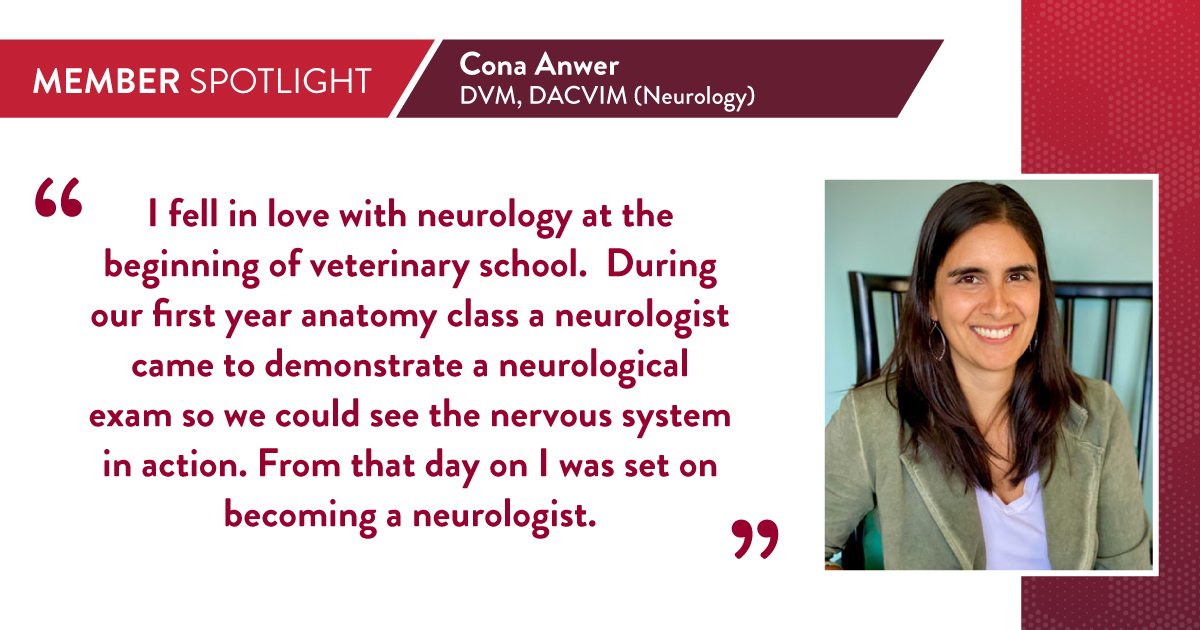Member Spotlight: Cona Anwer, DVM, DACVIM (Neurology)
Cona Anwer DVM, DACVIM (Neurology) (she/her)
What inspired you to become a Board-certified veterinary specialist?
I fell in love with neurology at the beginning of veterinary school. During our 1st year anatomy class a neurologist came to demonstrate a neurological exam so we could see the nervous system in action. From that day on I was set on becoming a neurologist.
Are there any resources or pieces of advice that helped you along the way? Is there any advice you would specifically give to job seekers?
As one of my mentors, Dr. Lecouteur, used to tell us: “Work as you mean to go on.” Think about your own work-life balance needs and start your job with that balance. Don’t promise yourself you will find it later.
What is something unique about your career, or career path?
Perhaps the most unique thing about my career path is how straightforward it was! I wanted to be a veterinarian for as long as I can remember and went directly from undergraduate school to veterinary school. Once I started veterinary school I was determined to become a neurologist. I was lucky enough to do a general internship, neurology internship, and residency all in row with no alternative paths and landed happily in private practice afterwards.
What is something you wish the general public knew about veterinary specialists?
I am really good at neurology, but not good at anything else! I can do neurosurgery just fine, but I can’t help you with your pet’s skin infection or diarrhea or persistent cough.
How is specialty veterinary medicine paving the way for advances in veterinary science?
The training for specialty practice involves research experience, which pushes us to ask questions and look for better ways to do things. For some of us it awakens a passion for research that we take into the rest of our careers.
When it comes to increasing diversity in veterinary specialty medicine, what kind of resources or changes would you like to see from the ACVIM and/or similar organizations?
I certainly think that financial assistance would go a long way towards making specialty medicine more equitable. Most veterinarians finish school with a high load of debt, and then go on to do internships and residencies that may not actually pay enough to cover the cost of living. Requiring a minimum salary during residencies or offering financial assistance could go a long way towards getting some veterinarians into specialty practice that would otherwise worry that they could not afford to go through the training.
What do you consider a challenge you’ve faced in your career? How did you overcome it?
Starting a family while having a full-time career was (and continues to be!) one of the hardest things I have ever done. The most helpful for me was to be kind to myself and admit that I cannot do everything. I cannot be a powerhouse neurologist that helps every single emergency and writes journal articles on the side and be a super mom at the same time. But I can be a pretty good neurologist that sometimes has to leave early, and a pretty good mom that may miss bedtime sometimes.
What impact has the ACVIM had in shaping your career?
There would be no college to become a specialist in neurology if it weren’t for the ACVIM. I am grateful to all those that came before me and contributed to the profession to make it what it is today. I volunteer for the ACVIM to show my gratitude and give back.

